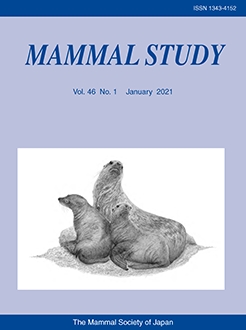Despite of great variation of food habits of the raccoon dogs (Nyctereutes procyonoides) on the Japanese archipelago, information of the food habits of them in the warm temperate zone in southern Japan is limited. The food habits of them on Suwazaki Peninsula in western Shikoku Island, southwestern Japan, were studied using fecal analysis. The sampling period spanned May 2019 to April 2020. The point-frame method was adopted. Fruits (pericarp and pulp) were important, accounting for > 30% in autumn and > 20% in winter. The fruit of Aphananthe aspera was particularly important, but various fruits were eaten in seasonal succession, and many fleshy tree fruits in the warm temperate zone were utilized. Insects were also important, accounting for > 20% in spring, summer, and early winter. Mandarin oranges comprised about 40% of the diet in late winter. Mammals and birds were less utilized than in other areas. The food habits of raccoon dogs on Suwazaki Peninsula were characterized by the diverse fruits and insects of the warm temperate zone together with cultivated mandarin oranges. These results suggest the opportunistic food habits of the raccoon dog.
How to translate text using browser tools
21 December 2020
Opportunistic Food Habits of the Raccoon Dog — A Case Study on Suwazaki Peninsula, Shikoku, Western Japan
Seiki Takatsuki,
Masakazu Inaba,
Kiyokazu Hashigoe,
Hiromitsu Matsui
ACCESS THE FULL ARTICLE

Mammal Study
Vol. 46 • No. 1
January 2021
Vol. 46 • No. 1
January 2021
diet
fecal analysis
omnivorous
warm temperate zone




